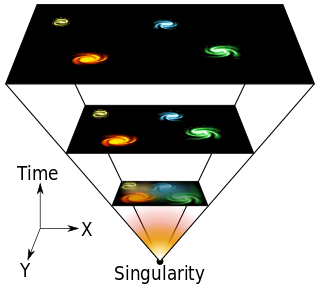Cosmogony
branch of science or a theory concerning the origin of the universe From Wikipedia, the free encyclopedia
Remove ads
Cosmogony is any theory of the origin of the universe.[1][2][3]
Examples
Physics

In astronomy, cosmogony is the study of the origin of things like the universe, the Solar System, or the Earth–Moon system.[1][2] The popular cosmological model for the birth of the universe is the Big Bang theory.[4]
It is generally accepted that the universe began as a singularity, and when the singularity of the universe started to expand, the Big Bang occurred, which began the universe.
People disagree on the origins of the singularity.[5]
It may be like a black hole, which is a singularity sincegravity in a black hole becomes boundless.
Others like Stephen Hawking say "time" did not exist and was only born with the universe. Hence the universe does not have an origin story. Time did not exist before the creation of the universe.[5][6]
There is currently no theoretical model that explains the earliest moments of the universe's existence (during the Planck time). This is because we lack a testable theory of quantum gravity. Still, some researchers in string theory, M theory, and loop quantum cosmology have some ideas.[7][8]
Mythology
There are certain myths that also propose how the universe was created: for example creation myths in the Bible, the Dào Dé Jīng, and other genesis stories. These usually involve
- a supreme being or god
- birth via sex between male and female gods
- or birth via the cosmic egg[9]
The Eridu Genesis, written on Sumerian tablets, is one of the oldest creation myths. The universe was created from a sea (Abzu).[10][11] In Greek mythology, Zeus created the universe from chaos.[12] Aztec creation has four versions of earth being created and destroyed, before settling the fifth and current earth. In Bushongo creation, the great god Bumba vomited up the sun, then the earth and everything else.
Remove ads
It is not the same as cosmology
Cosmology studies the universe in general. You can still study the universe without thinking about its origin, which is what cosmonogy studies specifically.[4][6][13]
References
Wikiwand - on
Seamless Wikipedia browsing. On steroids.
Remove ads